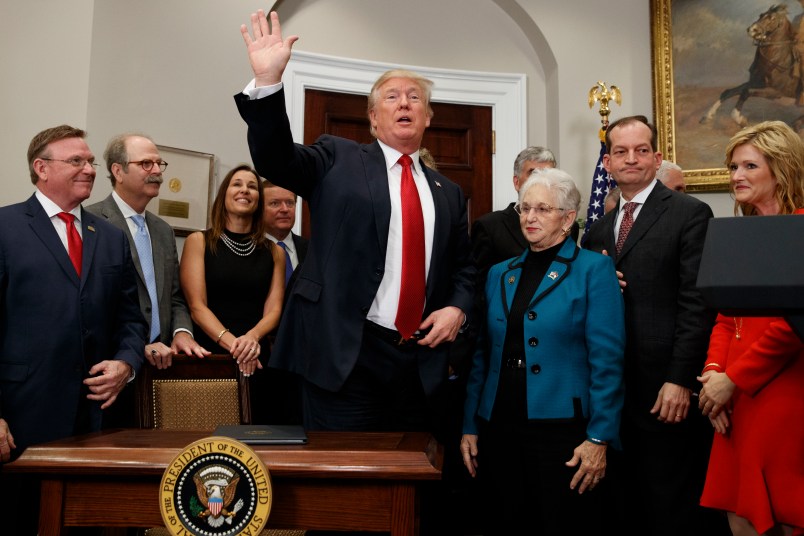What Republicans are calling “tax reform” is shaping up as the worst kind of legislative mess. To the degree we know specifics, the plan would amount to a massive windfall for the wealthiest Americans. This is hardly surprising. What is surprising are the ways the chaos and disorganization within the GOP (and perhaps also a sense of invulnerability) have led to the creation of a law which would actually hurt a lot of people who really don’t need to be hurt and are politically powerful to boot.
Let me explain what I mean.
Here the 2001 Bush tax cut is the archetype. The law was a windfall for the very wealthy. But for very good political reasons, the authors of the bill were careful to make sure the great majority of Americans did get some tax relief. The gains for middle and lower income people were meager, arguably trivial. But the Bush team could say accurately that there was relief for everyone or close to everyone. The political logic of doing this is obvious.
The Trump ‘tax reform’ actually manages to raise taxes on a substantial number of people. Big picture, it’s a massive tax cut for the very wealthy and the mind-bogglingly wealthy, paid for – among other things – by a substantial tax increase for the upper middle class and the only moderately wealthy. The moderately wealthy can probably afford to pay higher taxes. Why they should do so to fund massive cuts for the extremely wealthy isn’t at all clear. What is significant on a political calculus is that wealthy people vote and make their views heard in the political world, through campaign contributions and in other ways as well. Put simply, they can fight back. That may not be fair. But it is the system we live in today. That makes this legislation not just bad policy but highly questionable politics.
The bill also ends tax deductions that are mainly enjoyed by people in blue states. The biggest example is the ability to deduct state income taxes against federal taxes. This hits lots of voters in states with significant income taxes, many quite wealthy but also a lot of middle class families.
There are two points to note about this. It’s not just bad policy. It’s hazardous politics. It’s not fair but more affluent people have much more ability to fight back than more marginalized or poorer populations. The Trump crew is figuring it’s not a problem since a lot of those people are in blue states and thus don’t matter. But it’s not quite that clear. There are red or purple states with income taxes. There are also lots of GOP members of the House of Representatives in Republican districts in blue states. Look how many Republicans there are in the California House delegation.
The other point to note is that Republicans and particularly President Trump have been arguing that this is a question of equity, that red states are subsidizing blue states with this exemption. There is a narrow argument here. Income tax states get a deduction than no-income tax states don’t, in practice, get. There’s nothing for them to deduct. But in the great majority of cases those income tax states send far more tax money to the federal government than they get back. The money ends up going to (mainly) low tax red states which get much more back from the federal government than they pay in taxes. In other words, in the vast majority of cases the subsidy is going in the opposite direction.
Setting aside the policy equities involved, Trump and the GOP are bringing the politics of grievance to tax policy, arguing that red states which are subsidized by blue states are actually being victimized. There’s a lot here that bears watching.
But let’s return to the politics. This is an awful piece of legislation, to the extent we know the details. Democrats should oppose it on policy terms even if somehow the politics of it passing were great for Democrats. But it is also a very politically vulnerable piece of legislation. It hurts a lot of people who have the power to make their voices heard in the political process. It also puts Republicans in income tax states in a vulnerable position. There are also Republicans in the Senate who are not comfortable with the way this is likely to balloon the deficit. Normally I’d expect those folks to fold. But Trump’s escalating fight with Senators like Bob Corker may … may shift that calculus.
There’s one more political point to keep in mind – perhaps the key one.
Republicans are currently in a bad spot with their committed partisans and with their funders over their inability to accomplish anything on the legislative front even though they control the entire government. In political terms, the inability to act on Obamacare has been deeply damaging. ‘Tax reform’, which is actually a huge tax cut, is shaping up as the last chance to deliver. Normally, cutting taxes should be the easiest thing in the world for Republicans. It’s goodies for everyone. The losers only see the losses in indirect ways. But they’ve got a bill that is vulnerable because of its sloppy construction. They’re coming off an Obamacare battle that has seriously drained their credibility as a party that wants to pass laws that help as opposed to harm people. Finally, Trump’s has sown the whirlwind within his own party. Each of those factors are going to make difficult what should be easy. They are also is desperate need for a ‘win’.
All of which comes back to this point. Opposing this bill is obvious for Democrats in policy terms. It’s terrible legislation. But in political terms it is also a huge, huge opportunity. Democrats can do a lot to make a Republican loss more likely. If they can force a defeat on the tax cut, they will usher the GOP into 2018 with a deeply unpopular President and no legislative accomplishments whatsoever. That would be a victory which sets the GOP up for, though by no means guarantees, a shattering result in the 2018 midterm elections. It is shaping up as the final, everything on the line battle of year one of the Trump presidency. The politics and policy all point in the same direction. Democrats should do everything in their power to block this effort. The rewards in policy and political terms will be immense.









